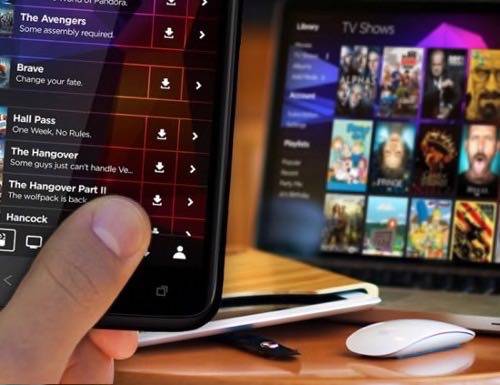
Editor’s note: This post was originally published by our partners at Gear Patrol.

The early years of the digital media revolution promised an unprecedented era of media freedom. Consumers had the power to play vast libraries of video and music on an armada of different devices. Someone just had to make syncing it all easy. Apple realized the opportunity early, and its foresight soon transformed into a billion dollar business.
Few remember that the original iTunes was essentially a re-engineered version of SoundJam MP, a music software company Apple acquired in 2000. Most also forget that iTunes didn’t support the original iPod when it launched. That feature came with update 2.0, and it helped kick start the iPod into a global phenomenon.
Today, another personal media sea-change is afoot. Improved broadband and cellular data networks have removed concerns around limited local storage and now offer consumers access to troves of movies, TV shows and music any time they’re online. Thanks to services like Netflix Instant and Spotify, the need to own a particular song or episode may soon be a pointless compulsion in the face of unlimited access. Most of us aren’t there yet, though.
For most consumers still clinging to ownership of their digital media, Apple’s relatively new iTunes in the Cloud product tiptoes towards an untethered future, especially for Cupertino cult members who’ve amassed most of their digital library from the iTunes store. But it still leaves plenty to be desired, particularly for those dabbling in other digital ecosystems.
Enter Qvivo, Master Of Cloud Media
Qvivo is a new cloud media service startup that succeeds where most others have failed in offering a dream streaming solution for video and music fans with large digital libraries. Starting at $1.99 a month, Qvivo offers unlimited cloud storage for movies, TV shows and music that can then be streamed through any modern web browser.

For an extra dollar a month, users can access their media hoards across a host of free apps for iPhone, iPad and Android. At $4.99, Qvivo’s premium service adds priority upload speeds and the ability to share accounts with up to four family members. If it all sounds simple, it is.
In fact, Qvivo’s laser focus on simplicity is its biggest differentiation. Building your Qvivo library in the cloud is a largely painless process. iTunes users can simply drag files from their library into the Qvivo app to immediately start uploading, or alternatively select a media folder from their desktop.
While upload speeds will always vary by connection, the software deftly handles large file queues in the background; this makes setting up large batches of content to transfer overnight or at other off hours easy. Metadata for movies is automatically added on upload as well, along with a movie poster and background image, creating an elegant browsing experience on the fly. The same goes for music album artwork.
Theres’s no need to worry whether your local files will be compatible across various devices, platforms and screen resolutions: Qvivo automatically compresses and encodes all content into a variety of formats to ensure universal playback and optimal performance. That may disappoint video and audio nuts who take pride in format snobbery, but for the average user who just wants things to work seamlessly, it’s an enormous plus.
Start Watching Here, Continue Over There
Claims of integration across all media platforms aren’t just lip service. If you start watching an HD movie on your phone and want to finish it on your tablet, Qvivo remembers where you left off. The mobile app also offers the ability to download either a high quality or low quality version of any movie, show or song locally to a mobile device in situations where a solid internet connection isn’t guaranteed. Apple TV owners can leverage the AirPlay option in the iPhone and iPad apps to watch or listen via their home theater, too.
All of these features performed as advertised when we put the service to the test by uploading over 500GB of movies and music. Occasionally the app had trouble adding the correct metadata to select foreign movie titles and random albums, and a few files wouldn’t upload on the first try; streaming hiccuped once or twice, which was solved by closing and restarting the app. But these instances were rare, a minor nuisance to an otherwise mind-blowingly good experience.
We will say that the ability to host music is a welcome consideration, but the decision to group files by album, a lack of support for playlists and the inability to stream while a mobile device is sleeping or using another app limits its value in comparison to other cloud music services (the exception being for audiophiles with bigger, high-quality libraries). Movies and TV shows are clearly Qvivo’s true strong suit, largely because equivalent services simply don’t exist.
iTunes was never a particularly good piece of media management software. It just excelled at organizing and transferring music and shows across various devices. Somewhere along the way, Apple lost sight of this value in the age of cloud computing. We’ve been patiently waiting for the day when putting our personal media in the cloud didn’t require investing in a single ecosystem, media store or hardware solutions like a NAS.
But… There’s No Backup
With Qvivo that moment has finally arrived. When it comes to accessing personal video from anywhere, the service is everything we could have asked for — save, that is, for a dedicated Apple TV or Roku app, which we’re sure the team must be investigating.
If we have to call out a downside, it’s that Qvivo doesn’t yet deliver on the other great benefit commonly associated with cloud hosting — backup. Streaming is great, as is the ability to download one-off files to mobile devices. But we’d also love to know that once our media was in the Qvivo cloud it could be downloaded again to any other device we owned, in its original uploaded format, just in case something terrible were to happen to our locally stored library. Or if we just needed to free up some hard drive space.
Maybe this service will be added in the future. Maybe it won’t. Either way, we’re grateful that Qvivo has figured out how to make building a personal cloud media library both easy and powerful — because Apple, Google, Dropbox, Amazon and the other major players still don’t have a clue.
More From Gear Patrol:
Canon EOS Rebel T5i: Entry Level, Redefined
Walkaround Guys: 5 Best Everyday Kit Lenses
Hot Shot: Five Apps to Help You Shoot Like a Pro
Breakdown: Mac Pro
The Smarter Athlete: The Best Apps to Train, Motivate and Diet

















